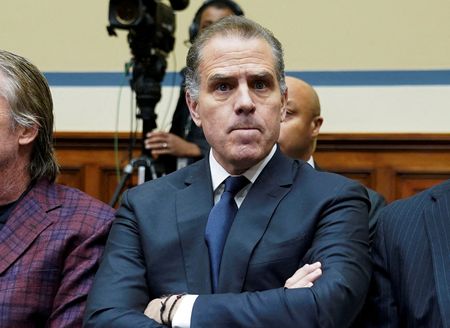WILMINGTON, DE – In an unprecedented move, President Joe Biden has issued a full and unconditional pardon to his son, Hunter Biden, who faced federal convictions for tax fraud and gun charges. This decision marks the first time a sitting U.S. president has pardoned his own child.
The decision comes days before Hunter Biden faced sentencing for his convictions.
Hunter Biden’s legal troubles included a guilty plea to tax violations and convictions on firearms-related charges. Despite the president’s earlier assurances that he would not interfere in his son’s legal matters, he reversed course, stating that Hunter was “selectively, and unfairly, prosecuted” due to their familial relationship.
“Today, I signed a pardon for my son Hunter. From the day I took office, I said I would not interfere with the Justice Department’s decision-making, and I kept my word even as I have watched my son being selectively, and unfairly, prosecuted. Without aggravating factors like use in a crime, multiple purchases, or buying a weapon as a straw purchaser, people are almost never brought to trial on felony charges solely for how they filled out a gun form. Those who were late paying their taxes because of serious addictions, but paid them back subsequently with interest and penalties, are typically given non-criminal resolutions. It is clear that Hunter was treated differently,” Biden said in statement.
The pardon has ignited a firestorm of criticism, particularly from Republican circles. President-elect Donald Trump condemned the action as an “abuse and miscarriage of justice,” while other GOP members accused Biden of hypocrisy and undermining the integrity of the justice system.
“The charges in his cases came about only after several of my political opponents in Congress instigated them to attack me and oppose my election. Then, a carefully negotiated plea deal, agreed to by the Department of Justice, unraveled in the court room – with a number of my political opponents in Congress taking credit for bringing political pressure on the process. Had the plea deal held, it would have been a fair, reasonable resolution of Hunter’s cases,” Biden continued. “No reasonable person who looks at the facts of Hunter’s cases can reach any other conclusion than Hunter was singled out only because he is my son – and that is wrong. There has been an effort to break Hunter – who has been five and a half years sober, even in the face of unrelenting attacks and selective prosecution. In trying to break Hunter, they’ve tried to break me – and there’s no reason to believe it will stop here. Enough is enough.”
In his defense, President Biden emphasized that similar cases typically result in non-criminal resolutions and argued that political opponents instigated the charges against Hunter. He expressed hope that Americans would understand the dual role he plays as both a father and the president in making this difficult decision.
“For my entire career I have followed a simple principle: just tell the American people the truth. They’ll be fair-minded. Here’s the truth: I believe in the justice system, but as I have wrestled with this, I also believe raw politics has infected this process and it led to a miscarriage of justice – and once I made this decision this weekend, there was no sense in delaying it further. I hope Americans will understand why a father and a President would come to this decision,” President Biden said.
Hunter Biden acknowledged his past mistakes during a period of addiction and expressed gratitude for the clemency, vowing to devote his life to helping others who are struggling.
This development adds a complex layer to the ongoing discourse surrounding the intersection of personal relationships and presidential authority, raising questions about the appropriate use of executive clemency.

